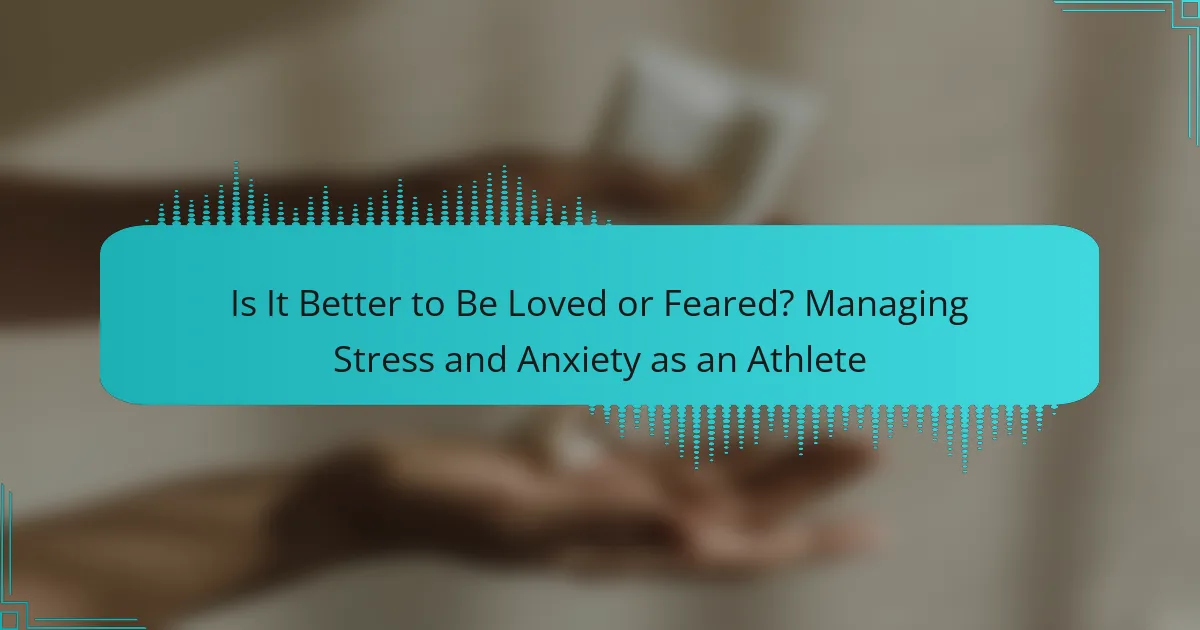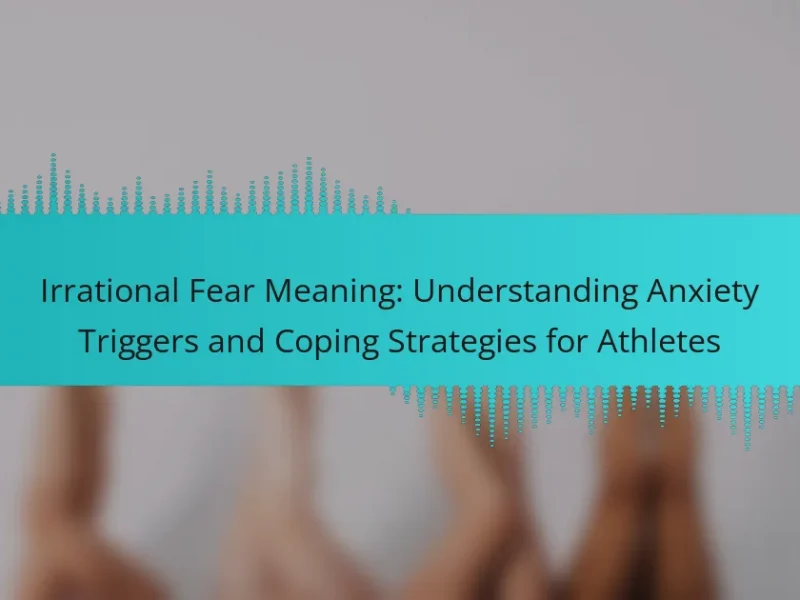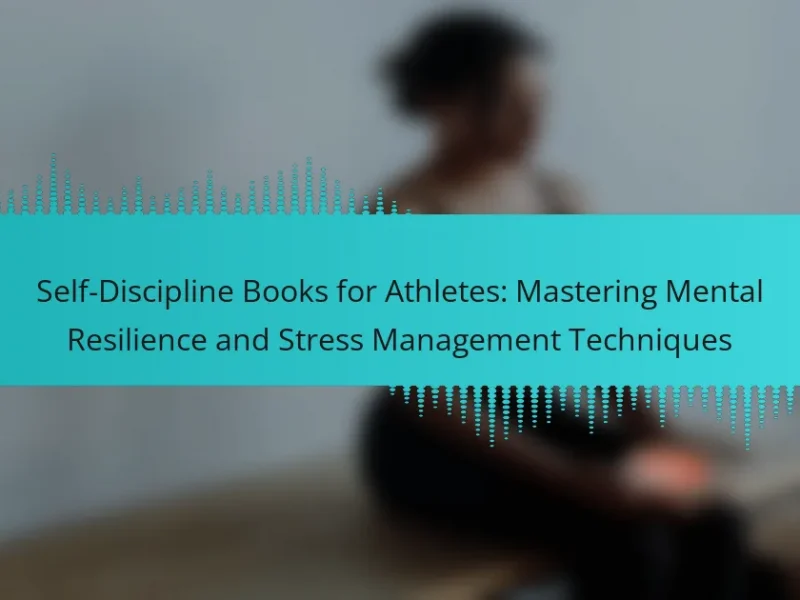Balancing love and fear is crucial for athletes managing stress and anxiety. Love fosters motivation and emotional resilience, while fear can hinder performance. This article explores effective coping strategies such as mindfulness, structured routines, and social support. It also examines unique methods like visualization and sound therapy that enhance mental well-being and performance.
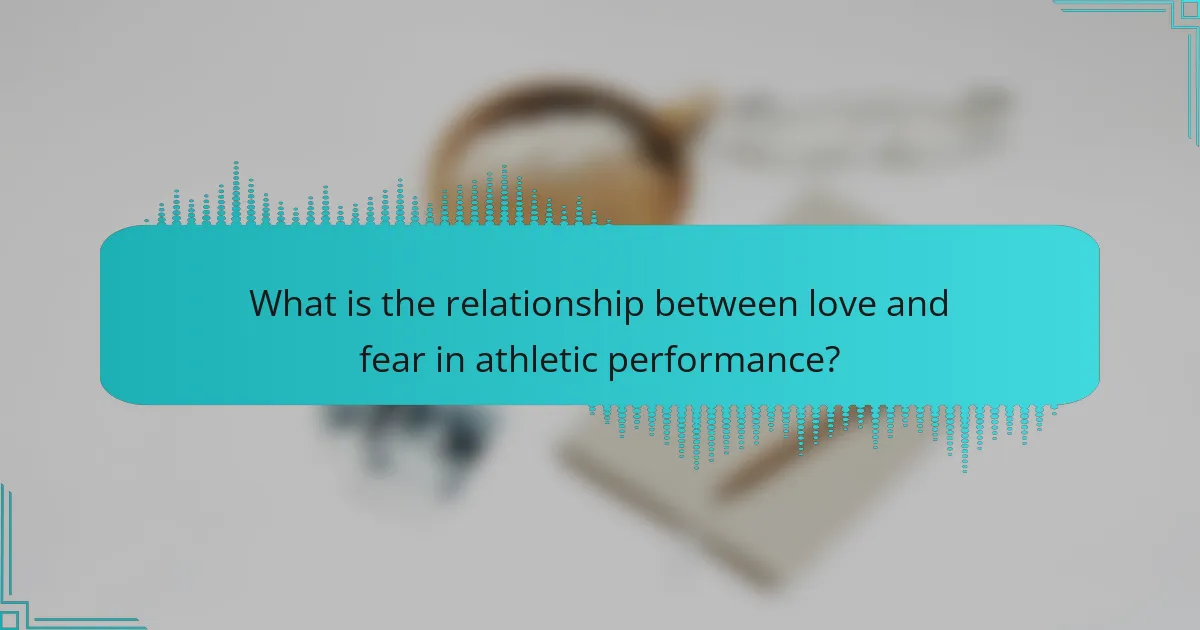
What is the relationship between love and fear in athletic performance?
Love can enhance athletic performance by fostering motivation and emotional resilience, while fear may lead to stress and anxiety. Athletes often thrive in supportive environments where love is present, as it boosts confidence and reduces performance anxiety. In contrast, fear of failure can hinder focus and decision-making, negatively impacting performance. The balance between these emotions is crucial; love encourages growth, while fear can be a barrier. Research indicates that athletes who feel loved perform better under pressure compared to those driven by fear.
How do love and fear influence an athlete’s mindset?
Love and fear significantly shape an athlete’s mindset. Love fosters confidence and motivation, while fear can drive performance through heightened focus. Balancing these emotions is crucial for managing stress and anxiety. Athletes who feel loved often exhibit resilience, whereas those driven by fear may experience pressure that can hinder performance. Understanding this dynamic helps athletes cultivate a supportive environment that enhances mental strength and overall well-being.
What are the psychological impacts of being loved versus being feared?
Being loved generally leads to more positive psychological impacts than being feared. Love fosters trust, motivation, and resilience, while fear can induce stress and anxiety. Athletes who feel loved often perform better due to increased confidence and emotional support. In contrast, those who are feared may experience heightened anxiety, negatively affecting performance. Studies indicate that supportive environments enhance mental well-being, promoting better focus and reduced stress levels in athletic contexts.
What role does team support play in managing stress?
Team support significantly reduces stress by fostering a sense of belonging and shared responsibility. Athletes who feel supported by their teammates often experience lower anxiety levels, enhancing performance. Research indicates that emotional and practical support from a team can improve mental resilience, allowing athletes to cope with pressure effectively. Additionally, strong team dynamics create an environment where athletes can communicate openly, share challenges, and develop coping strategies collectively. This unique attribute of team support is crucial for managing stress in competitive sports.
How do coaches’ approaches affect athlete anxiety?
Coaches’ approaches significantly influence athlete anxiety levels. Supportive coaching fosters confidence, reducing anxiety, while authoritarian styles may heighten stress. Research indicates that athletes thrive under positive reinforcement, enhancing performance and mental resilience. This dynamic underscores the importance of coaching style in managing athlete anxiety effectively.

What universal strategies help athletes cope with stress and anxiety?
Athletes can effectively cope with stress and anxiety by employing universal strategies such as mindfulness, structured routines, and social support. Mindfulness techniques enhance focus and reduce anxiety by promoting present-moment awareness. Structured routines provide a sense of control and predictability, which can alleviate stress. Additionally, strong social support networks foster resilience and offer emotional resources during challenging times. Emphasizing these strategies can lead to improved mental well-being and performance.
What are the benefits of mental conditioning for athletes?
Mental conditioning offers athletes enhanced focus, reduced anxiety, and improved performance. It equips them with mental resilience, enabling effective stress management during competitions. Techniques such as visualization and mindfulness foster a positive mindset, which can lead to better outcomes. Research shows that athletes who practice mental conditioning report higher confidence levels and greater satisfaction in their sport.
How does physical training impact mental resilience?
Physical training significantly enhances mental resilience by improving focus and reducing anxiety. Regular exercise releases endorphins, which promote a positive mood and decrease stress. Athletes often report increased confidence and better coping strategies through consistent training. This mental fortitude is crucial in high-pressure situations, allowing athletes to perform optimally. Research indicates that physical activity can lead to long-term improvements in mental health, making it an essential component of an athlete’s routine.
What techniques can athletes use for relaxation?
Athletes can use techniques like deep breathing, progressive muscle relaxation, mindfulness meditation, visualization, and yoga for relaxation. These methods reduce stress and anxiety, enhancing performance. Deep breathing focuses on controlled inhalation and exhalation, promoting calmness. Progressive muscle relaxation involves tensing and relaxing muscle groups, helping to release tension. Mindfulness meditation encourages present-moment awareness, reducing negative thoughts. Visualization allows athletes to mentally rehearse successful performances, boosting confidence. Yoga combines physical postures with breath control, fostering both mental and physical relaxation.
How can athletes leverage visualization for stress management?
Athletes can effectively use visualization to manage stress by creating mental images of success and calmness. This technique reduces anxiety and enhances focus during competitions. Studies show that visualization can lower cortisol levels, promoting relaxation. Additionally, athletes can practice specific scenarios in their minds, preparing them for high-pressure situations. This method not only boosts confidence but also fosters a positive mindset, essential for peak performance.
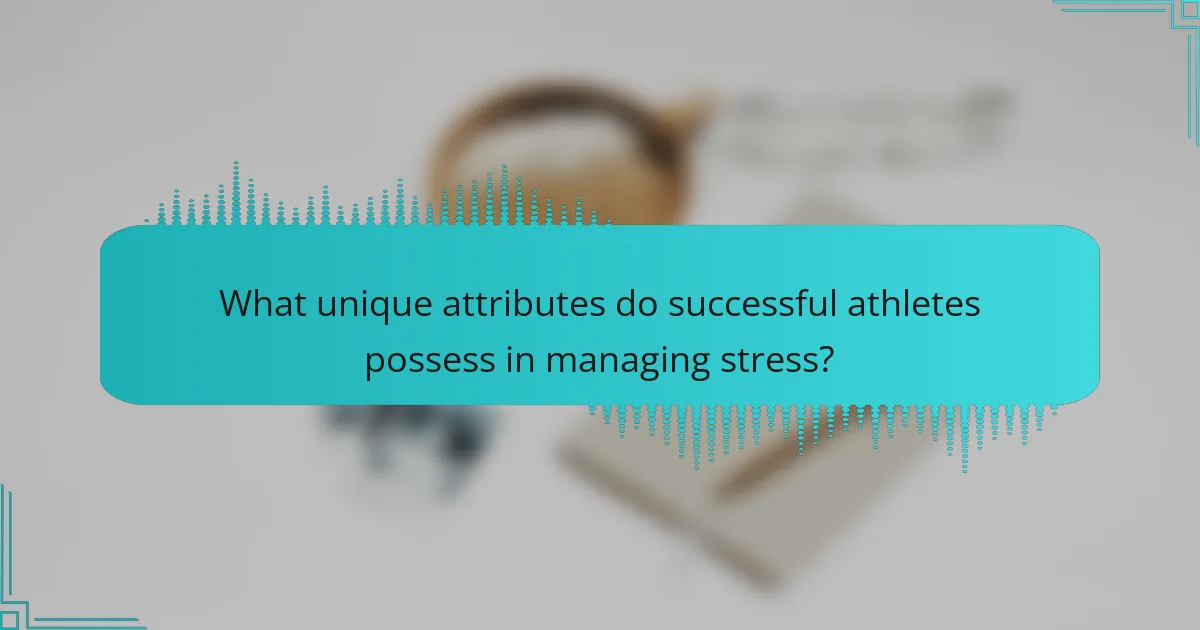
What unique attributes do successful athletes possess in managing stress?
Successful athletes possess unique attributes that enhance their stress management. These include resilience, emotional intelligence, and effective coping strategies. Resilience allows athletes to bounce back from setbacks, while emotional intelligence helps them understand and manage their emotions. Effective coping strategies, such as mindfulness and visualization, provide tools to navigate high-pressure situations. These attributes contribute to an athlete’s overall performance and mental well-being.
How does emotional intelligence contribute to athletic performance?
Emotional intelligence significantly enhances athletic performance by improving stress management and anxiety regulation. Athletes with high emotional intelligence can better recognize their emotions and those of others, leading to more effective communication and teamwork. This ability fosters resilience under pressure, allowing athletes to maintain focus and composure during competitions. Additionally, emotional intelligence helps athletes set realistic goals and maintain motivation, ultimately contributing to improved performance outcomes.
What role does self-talk play in reducing anxiety?
Self-talk significantly reduces anxiety by fostering a positive mindset. It encourages athletes to challenge negative thoughts and replace them with affirming statements. Research shows that athletes who engage in constructive self-talk experience lower anxiety levels and improved performance. This unique attribute of self-talk helps in building resilience, enabling athletes to manage stress more effectively.
How can athletes develop a growth mindset?
Athletes can develop a growth mindset by embracing challenges, learning from feedback, and persisting through setbacks. This mindset fosters resilience and improves performance under stress. Research shows athletes with a growth mindset are more likely to adapt and thrive in competitive environments. They view failures as opportunities for growth, enhancing their ability to manage anxiety and stress effectively.
What are the characteristics of resilient athletes?
Resilient athletes exhibit mental toughness, adaptability, and a strong support system. They maintain focus under pressure, embrace challenges, and learn from setbacks. Research indicates that resilience correlates with improved performance and reduced stress levels. These athletes often employ techniques such as visualization, goal-setting, and mindfulness to manage anxiety effectively.

What rare coping mechanisms can athletes explore?
Athletes can explore rare coping mechanisms like visualization, sound therapy, and art therapy to manage stress and anxiety. Visualization involves mentally rehearsing performances, enhancing focus and reducing anxiety. Sound therapy utilizes specific frequencies to promote relaxation and mental clarity. Art therapy allows athletes to express emotions creatively, providing an outlet for stress relief. These unique strategies can enhance mental resilience and improve overall performance.
How can unconventional therapies aid in stress management?
Unconventional therapies can significantly aid in stress management for athletes by providing unique coping mechanisms. Techniques such as mindfulness meditation, art therapy, and nature immersion foster emotional resilience. These approaches address stress from a holistic perspective, enhancing mental well-being and performance. Research indicates that mindfulness practices can reduce anxiety levels by up to 30%, promoting a focused mindset. Additionally, engaging in creative activities allows athletes to express emotions, reducing tension and fostering relaxation. By integrating these therapies, athletes can cultivate a balanced approach to stress management, improving overall performance and mental health.
What is the impact of peer support on anxiety levels?
Peer support significantly reduces anxiety levels among athletes. Studies show that athletes with strong peer support report lower stress and anxiety, enhancing performance. This unique attribute of camaraderie fosters a sense of belonging, which is crucial for mental well-being. As a result, athletes can manage stress more effectively, leading to improved focus and resilience in competition.
How can athletes utilize art or music for emotional expression?
Athletes can utilize art or music for emotional expression to manage stress and anxiety effectively. Engaging in creative activities allows athletes to channel their emotions, providing a therapeutic outlet. For instance, painting or playing an instrument can enhance focus and reduce tension. Research indicates that music can elevate mood, leading to improved performance. Moreover, art fosters a sense of identity and belonging, which is crucial for mental well-being in competitive environments.
What innovative practices are emerging in athlete mental health?
Innovative practices emerging in athlete mental health focus on holistic approaches and technology integration. Techniques like mindfulness training, cognitive behavioral therapy, and virtual reality exposure therapy are gaining traction. These methods enhance emotional resilience and reduce anxiety. Additionally, data analytics is being used to monitor mental health indicators, allowing for personalized interventions. As a result, athletes can manage stress more effectively, improving performance and overall well-being.
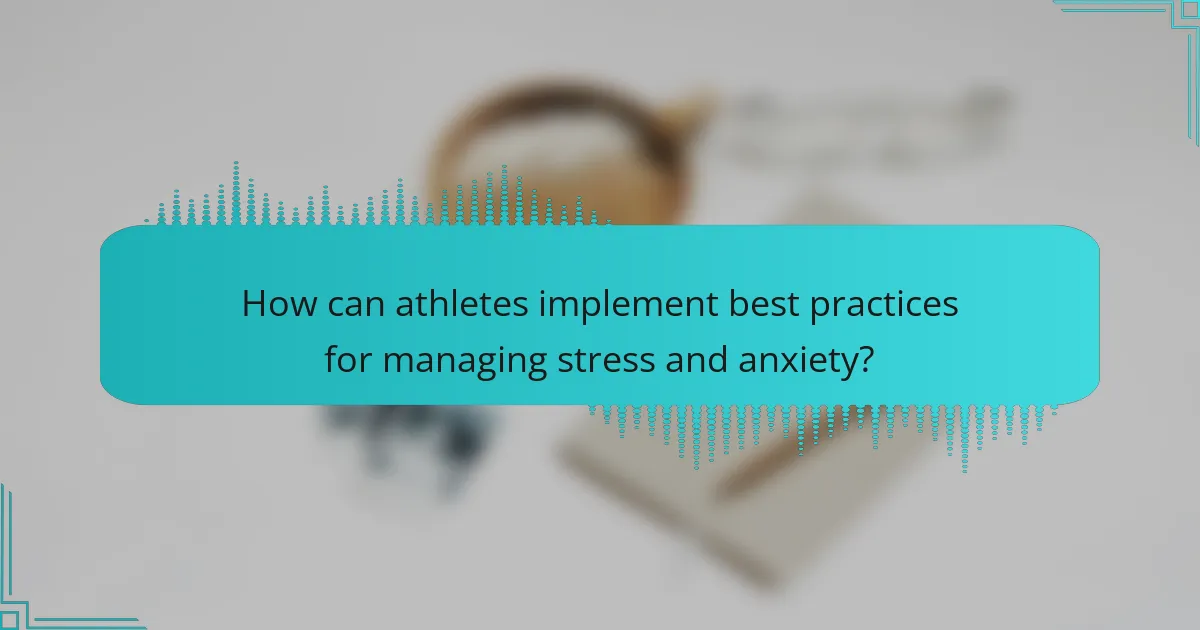
How can athletes implement best practices for managing stress and anxiety?
Athletes can effectively manage stress and anxiety by implementing structured routines and mindfulness practices. Establishing a consistent training schedule enhances focus and predictability. Mindfulness techniques, such as meditation and breathing exercises, promote emotional regulation. Engaging in open communication with coaches and teammates fosters support. Setting realistic goals helps maintain motivation while reducing pressure. Regular physical activity releases endorphins, which can alleviate anxiety symptoms. Prioritizing rest and recovery is essential for mental well-being, as fatigue can exacerbate stress.
What common mistakes should athletes avoid in stress management?
Athletes should avoid common mistakes such as neglecting recovery, ignoring mental health, and relying solely on physical training. These errors can exacerbate stress and anxiety. Prioritizing holistic approaches, including rest, mental techniques, and balanced training, enhances performance and well-being.
What expert insights can enhance coping strategies?
Expert insights can significantly enhance coping strategies for athletes managing stress and anxiety. Techniques such as mindfulness and visualization improve focus and reduce anxiety. Research indicates that regular mental training can enhance resilience, leading to better performance under pressure. Additionally, establishing a support network fosters emotional well-being, providing athletes with resources to cope effectively.
How can athletes create a personalized stress management plan?
Athletes can create a personalized stress management plan by identifying triggers, setting goals, and incorporating effective techniques. Begin by assessing stressors specific to training and competition. Next, establish clear, achievable objectives for managing stress levels. Integrate techniques such as mindfulness, breathing exercises, and physical activity tailored to individual preferences. Regularly review and adjust the plan based on effectiveness and changing circumstances. This approach fosters resilience and enhances performance.
What resources are available for athletes struggling with anxiety?
Athletes struggling with anxiety can access various resources for support. Mental health professionals offer therapy tailored for athletes, focusing on performance-related stress. Support groups provide a community for sharing experiences. Online platforms offer coping strategies and mindfulness exercises. Educational materials help athletes understand anxiety’s impact on performance. Mobile apps can assist with relaxation techniques and mental training.
